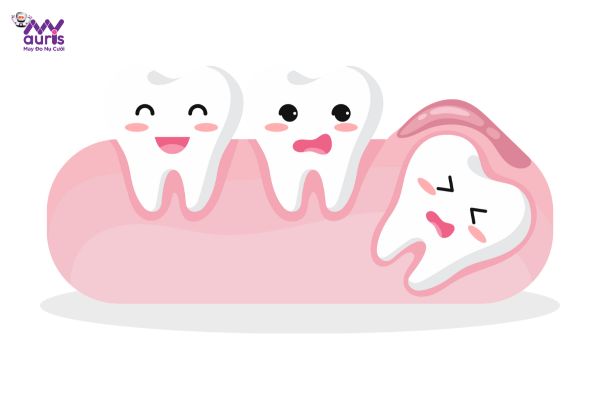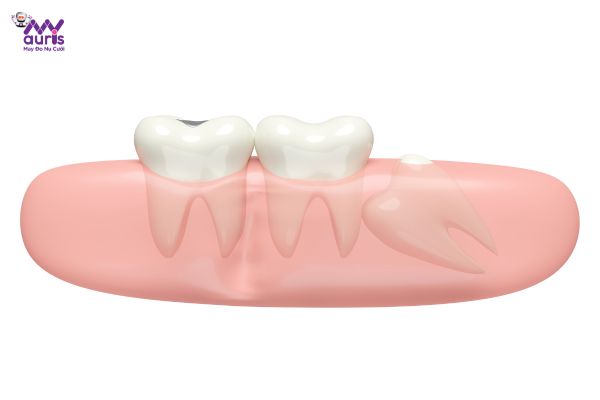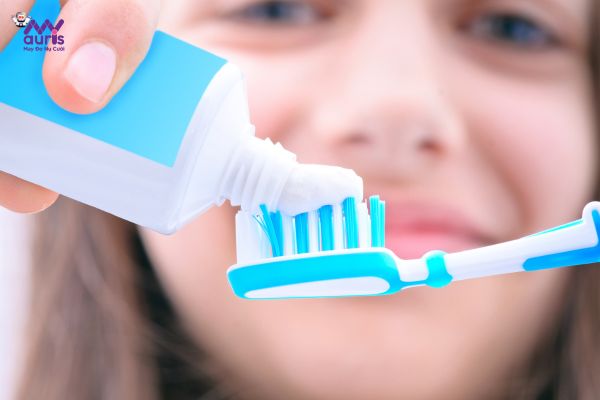Wisdom teeth are the last molars to grow when we humans reach adulthood. Accordingly, depending on the constitution, the number of wisdom teeth is different for each person. Most wisdom teeth growing in the upper jaw is more difficult and causes more pain than the upper jaw. To better understand lower wisdom teeth as well as gain experience in care, please follow the following article with My Auris.
Learn about lower wisdom teeth
Wisdom teeth are also known as tooth number 8 – This tooth grows last on the jaw next to tooth number 7 when we reach adulthood at 17-25 years old. However, depending on each person, wisdom teeth may grow earlier or slower than usual.
The lower wisdom teeth have 2 teeth, depending on the person, both teeth grow or some people only grow 1 tooth. Lower wisdom teeth often have 3 roots, or even 4 teeth. However, depending on each person, the roots of wisdom teeth will be different.
The lower wisdom teeth are large. They grow on the jaw, causing many effects on oral health. In case of teeth growing straight, it will be much better, but cases of teeth growing crooked, slanted, or impacted must be treated early to avoid dangerous complications.

Signs to recognize lower wisdom teeth growing
Wisdom teeth do not grow continuously but are divided into several stages. Each stage of the tooth emerges a little and causes constant pain. It can be said that the process of perfecting wisdom teeth takes a lot of time and this process greatly affects oral health, body, daily life and work. Here are some signs of wisdom teeth growing in the lower jaw:
Pain in the lower jaw
Pain is the most easily felt sign when wisdom teeth grow. You will feel a dull to severe pain in the inner corner of your lower jaw. The pain also spreads to the surrounding area, around the jaw. From there, it not only causes discomfort, affects work and daily life, but also interferes with eating and chewing. Toothache makes you lose your appetite and lose your appetite, leading to a lack of nutrients in your body that affects your health.
Severe pain also makes the jaw stiff and difficult to move. This causes difficulty in moving, smiling, talking, eating, etc.

Gingivitis
Wisdom teeth grow at a time when the jaw is complete, so there is not enough room left at this time, causing the gum area to separate, become swollen, and become red and inflamed teeth.
Difficulty opening the mouth, bad breath
The growth of the lower wisdom teeth makes it difficult to open the mouth, which is accompanied by signs of pain and difficulty swallowing, as well as inflammation of the gums conditions for bacteria and plaque to accumulate, leading to unpleasant breath. justify;”>Accompanied by fever and headache
Fever and headache are also symptoms of wisdom teeth growing. The reason is that wisdom teeth emerge into the jaw, breaking the barrier of the mucous layer in the oral cavity. Accordingly, bacteria have the opportunity to penetrate through plaque, causing gingivitis around the wisdom teeth. At this time, the body’s immune system begins to react to the infection. Inflammation causes fever and fatigue.
Moreover, pain caused by wisdom teeth growth also affects the nerves, leading to persistent headaches. class=”wp-caption aligncenter”> Not only does it cause pain and discomfort, lower wisdom teeth also greatly affect your oral health. Therefore, as soon as you recognize the signs, you should see a dentist for examination and appropriate treatment. Not all wisdom teeth can be removed, but it depends on the position and direction of the tooth’s growth. For wisdom teeth that grow straight, doctors recommend keeping the teeth. As for the following abnormal wisdom teeth, they should be removed early for better oral health: Inclined, crooked wisdom teeth Intruded or misaligned wisdom teeth will cause damage to the gums.swelling, redness, pus and prolonged pain. Removing teeth early helps protect your teeth, avoid affecting neighboring teeth, and prevent diseases from arising. Wisdom teeth affect tooth number 7 Wisdom teeth growing in the wrong position will cause misalignment and affect not only tooth number 7 but even the entire jaw. Accordingly, tooth number 7 is most affected. At this time, tooth number 7 also hurts, can become loose, and cause disease. Wisdom teeth are decayed Wisdom teeth are hidden deep in the jaw so it is difficult for a brush to reach. Furthermore, the tooth often tends to grow away from tooth number 7, creating a gap. This gap creates conditions for plaque to accumulate and bacteria to attack and cause disease. According to doctors, extracting lower wisdom teeth will be more complicated than upper wisdom teeth. However, with modern technology support and the effects of anesthesia, you will not feel pain or discomfort. After the anesthetic wears off, pain will come, but if you know how to care for it, clean it and eat, the pain will subside quickly and promote effective healing. In short, the information in the article about lower wisdom teeth will definitely help you gain more useful knowledge. Choose a reputable dentist, good doctor, and modern equipment to safely remove your wisdom teeth. If you still have concerns, please contact My Auris dentistry immediately for more detailed advice and answers. Anh Thy 
When should wisdom teeth be extracted? lower jaw?

How to care after lower wisdom teeth removed






